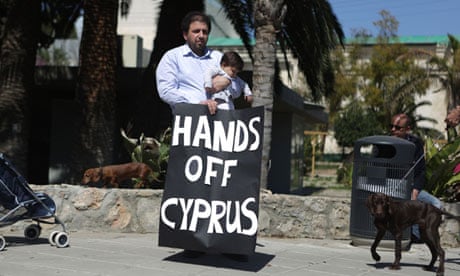Cypriot officials are working on tweaks to the controversial bailout plan to limit the damage to small savers from measures intended to seize up to 10% of all bank account deposits.
A parliamentary vote on the measure, planned for Tuesday, may be postponed as most members of parliament plan to reject it in its current form.
Cypriots have been outraged since they woke up this weekend to find an unprecedented EU bailout agreement that meant anyone with money in a Cyprus bank account - including the smallest current accounts or no-interest accounts - would have a percentage seized in order to secure an international deal to save the Mediterranean island from default and banking collapse.
Cypriot and eurozone officials are trying to modify the levy of 6.75% on deposits of up to €100,000 (£85,000), and 9.9% on those above €100,000 to ease the burden on small savers. A revised draft bill seen by Reuters would exempt savings under €20,000, charge a rate of 6.75% for amounts between €20,000 and €100,000 and maintain a 9.9% tax on deposits above that level.
But Cyprus's central bank chief said the new deal would raise less than the €5.8bn demanded by eurozone partners and the International Monetary Fund as a contribution to rescuing the island's shattered financial sector.
The government, under its new conservative leader, Nicos Anastasiades, maintains that Cyprus has no choice but to accept the bailout with the levy, or go bankrupt. But the 56-member parliament, scheduled to meet at 6pm on Tuesday, is still expected to vote no.
Anastasiades's party holds 20 seats out of 56; its coalition partner the DIKO, which has a further eight, has ruled out voting in favour of the levy, however. "It looks like it won't pass," a Cypriot government spokesman, Christos Stylianides, told state radio on Tuesday morning.
Rejection of the measure would effectively block the bailout that Cyprus needs to keep its banks afloat and pay state wages and welfare bills.
In France, the finance minister, Pierre Moscovici, urged Cyprus to drop its plan to tax people with less than €100,000 in their bank accounts. He said France was in favour of taxing only deposits over €100,000, which would not have been protected if a bank went bust. But he said the matter was up to the Cypriot government to decide.
The levy on savings over €100,000 will affect thousands of Russians who have bank accounts on the island, which has used tax deals to attract international deposits into a banking system that is now at least eight times the size of the island's €17bn economy.
An employee at a large Cyprus bank said: "Today is all about politics. The final decision will be a political one."
Banks in Cyprus were expected to remain closed until at least Thursday to avert a possible rush for withdrawals. Cashpoints were replenished on Monday but have a limit of €500 for cash withdrawals.
The Cyprus Mail reported that banks were trying to agree a uniform policy on dealing with the expected rush of customers when they do eventually open. Guards are expected to be posted outside branches to ensure security and to prevent overcrowding.Fiona Mullen, an analyst at Sapienta Economics, in Nicosia, said: "The banks staying closed is the only thing they can do for the time being.
"If the parliament can't agree a yes vote, banks could remain closed until politicians can get something that's acceptable to everybody rather than letting the banks fail."
Andreas Theophanous, professor of political economy at Nicosia university, described the levy as "shock therapy that may kill the patient". He said the EU deal had undermined the new president's credibility and already damaged the economy.
The main opposition party, the Communist AKEL party, said it would vote against any proposed levy on bank accounts, regardless of any possible changes. A party spokesman, George Loukaides, told the Guardian: "This bill is a disaster. Regardless of whether parliament votes yes or no, Cyprus's banking system and standing as a financial centre has already been hit very badly by this. The damage is already done. If there is a yes vote, our economy will go into deep recession and we will be forced to become even more dependent on international lenders."
Meanwhile, the ratings agency Fitch has put three Cyprus banks – Bank of Cyprus, Cyprus Popular Bank and Hellenic Bank – on rating watch negative while the bailout drama plays out.
In a statement, Fitch said it had taken the move because of Cyprus's decision to tax savers, by turning a percentage of their deposits into equity. It also suggested that it could downgrade the banks to "restricted default" status, if this actually occurred.
Fitch said: "The negative watches will be resolved after a decision by the Cypriot parliament on the above extraordinary measures, which could come as early as today.
